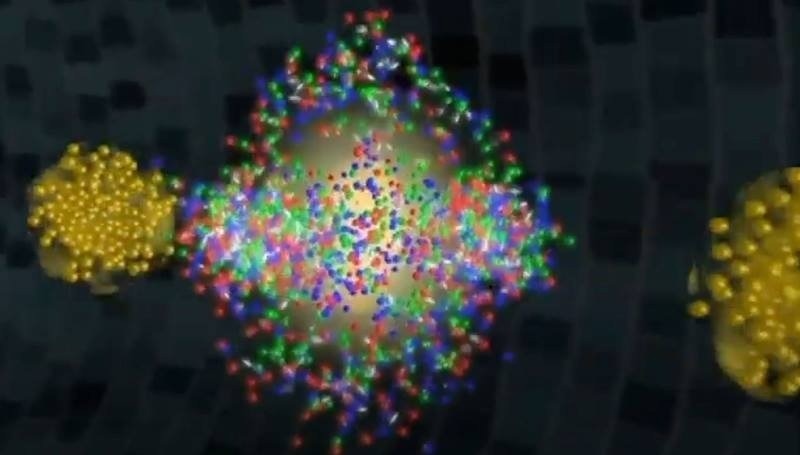
Conditions set up in the earliest stage of collisions of gold ions play the greatest role in causing fluctuations in the flow of particles, with more particles emerging along the reaction plane than perpendicular to it. Image Credit: Brookhaven National Laboratory.
The development of the matter produced by the collisions and its transformation into other particles at later phases had no impact. The results will enable researchers to focus on important characteristics of this particular type of nuclear matter.
The Impact
Quark-gluon plasma (QGP) is the name given to the matter produced in these collisions. This is a trillion-degree soup of quarks and gluons that replicates what the universe was like a microsecond after the Big Bang. One of the main goals of nuclear physics is to understand its properties.
Identifying initial-state conditions primarily responsible for fluctuations in the flow of particles from the QGP will help physicists make more precise calculations of the plasma’s properties, including its viscosity.
This will aid their understanding of how the collision converts nuclei from a collection of protons and neutrons into a plasma of quarks and gluons.
Summary
Nuclear physicists use the Relativistic Heavy Ion Collider (RHIC) to collide atomic nuclei to investigate quark-gluon plasma (QGP). Protons and neutrons are melted in the collisions, releasing their constituent quarks and gluons.
Particles are preferentially pushed out along the reaction plane of the colliding nuclei rather than perpendicular to it in off-center collisions. However, the flow is not exactly as effortless as that simplistic picture portrays.
There are several variations. The STAR Collaboration conducted this investigation to identify the cause of the variations. The researchers evaluated the impact of initial state effects by examining collisions of different-size nuclei (gold-gold, uranium-uranium, and copper-gold) and how head-on vs. glancing they were.
They also examined the impact of collision energy to see whether the QGP development through time impacted flow patterns. Moreover, the team also looked into whether there were differences in the fluctuations between different types of hadrons, which are composite particles made when quarks and gluons recombine.
The size of the colliding nuclei and the degree of a head-on collision was shown to have the most effects on flow fluctuations. These findings will aid in limiting important parameters necessary for more accurate predictions of QGP features like viscosity and for comprehending phase shifts in nuclear matter.
The US National Science Foundation, the Department of Energy Office of Science’s Nuclear Physics program, as well as several international organizations and agencies that are named in the accompanying publication provided funding for this study.
The STAR team used the computing resources at the Open Science Grid consortium, the National Energy Research Scientific Computing Center (NERSC) at Lawrence Berkeley National Laboratory, and the Scientific Data and Computing Center at Brookhaven National Laboratory.
Journal Reference:
Zhu, Y., et al. (2022) Collision-System and Beam-Energy Dependence of Anisotropic Flow Fluctuations. Physical Review Letters. doi:10.1103/PhysRevLett.129.252301.